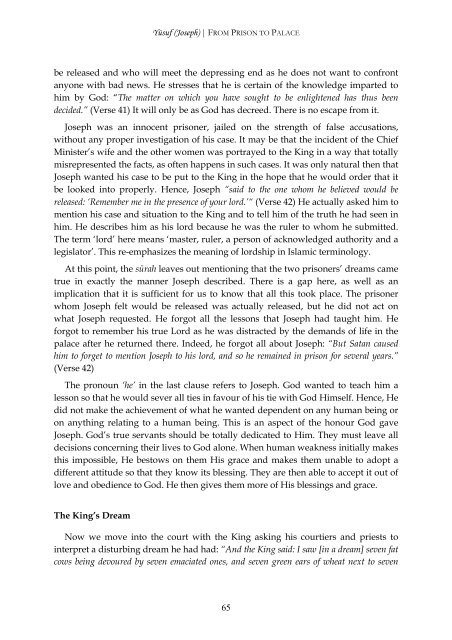Volume 10 Surah 12 - 15 - Enjoy Islam
Volume 10 Surah 12 - 15 - Enjoy Islam
Volume 10 Surah 12 - 15 - Enjoy Islam
You also want an ePaper? Increase the reach of your titles
YUMPU automatically turns print PDFs into web optimized ePapers that Google loves.
Yūsuf (Joseph) | FROM PRISON TO PALACE<br />
be released and who will meet the depressing end as he does not want to confront<br />
anyone with bad news. He stresses that he is certain of the knowledge imparted to<br />
him by God: “The matter on which you have sought to be enlightened has thus been<br />
decided.” (Verse 41) It will only be as God has decreed. There is no escape from it.<br />
Joseph was an innocent prisoner, jailed on the strength of false accusations,<br />
without any proper investigation of his case. It may be that the incident of the Chief<br />
Minister’s wife and the other women was portrayed to the King in a way that totally<br />
misrepresented the facts, as often happens in such cases. It was only natural then that<br />
Joseph wanted his case to be put to the King in the hope that he would order that it<br />
be looked into properly. Hence, Joseph “said to the one whom he believed would be<br />
released: ‘Remember me in the presence of your lord.’“ (Verse 42) He actually asked him to<br />
mention his case and situation to the King and to tell him of the truth he had seen in<br />
him. He describes him as his lord because he was the ruler to whom he submitted.<br />
The term ‘lord’ here means ‘master, ruler, a person of acknowledged authority and a<br />
legislator’. This re-emphasizes the meaning of lordship in <strong>Islam</strong>ic terminology.<br />
At this point, the sūrah leaves out mentioning that the two prisoners’ dreams came<br />
true in exactly the manner Joseph described. There is a gap here, as well as an<br />
implication that it is sufficient for us to know that all this took place. The prisoner<br />
whom Joseph felt would be released was actually released, but he did not act on<br />
what Joseph requested. He forgot all the lessons that Joseph had taught him. He<br />
forgot to remember his true Lord as he was distracted by the demands of life in the<br />
palace after he returned there. Indeed, he forgot all about Joseph: “But Satan caused<br />
him to forget to mention Joseph to his lord, and so he remained in prison for several years.”<br />
(Verse 42)<br />
The pronoun ‘he’ in the last clause refers to Joseph. God wanted to teach him a<br />
lesson so that he would sever all ties in favour of his tie with God Himself. Hence, He<br />
did not make the achievement of what he wanted dependent on any human being or<br />
on anything relating to a human being. This is an aspect of the honour God gave<br />
Joseph. God’s true servants should be totally dedicated to Him. They must leave all<br />
decisions concerning their lives to God alone. When human weakness initially makes<br />
this impossible, He bestows on them His grace and makes them unable to adopt a<br />
different attitude so that they know its blessing. They are then able to accept it out of<br />
love and obedience to God. He then gives them more of His blessings and grace.<br />
The King’s Dream<br />
Now we move into the court with the King asking his courtiers and priests to<br />
interpret a disturbing dream he had had: “And the King said: I saw [in a dream] seven fat<br />
cows being devoured by seven emaciated ones, and seven green ears of wheat next to seven<br />
65

















